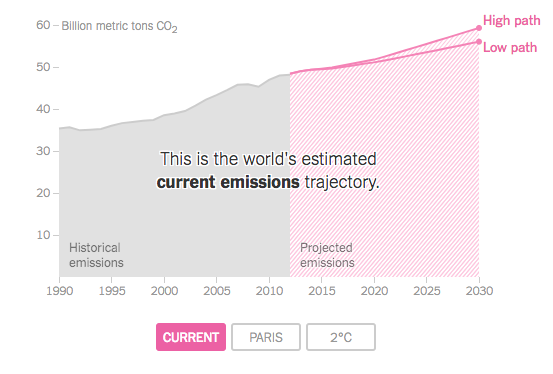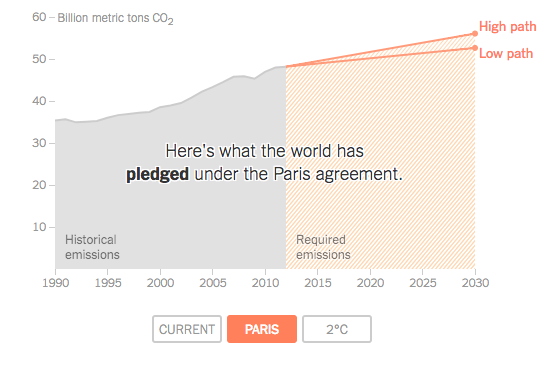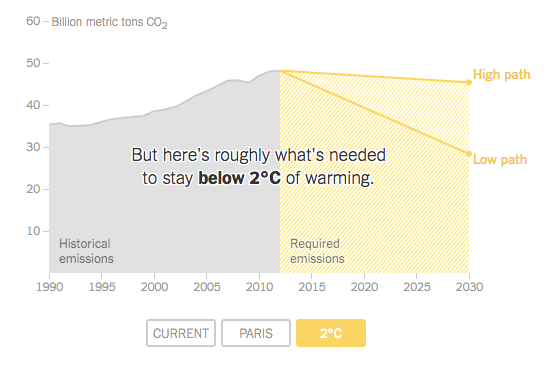The UN Climate Conference at Bonn is coming to a close today. While Paris Climate Conference in 2015 was the historical moment of unity, this conference might become known as the one shadowed by an unprecedented level of urgency. Both 2015 and 2016 were the hottest years on record; in 2016, the CO2 in the atmosphere reached its highest level in 800,000 years. In 2017, the Earth was hit with record-breaking hurricanes in the Atlantic as well as devastating wildfires worldwide.

- In face of such calamities, the world finally seems to be coming together: Syria became the last country to join the Paris agreement this week, making the U.S. the only country in the world that’s seeking to leave the agreement.
- World leaders had strong warnings and calls to action: French President Emmanuel Macron said, “The fight against climate change is by far the most significant struggle of our times.” “Climate change is an issue determining our destiny as mankind–it will determine the wellbeing of all of us,” said Angela Merkel, the Chancellor of Germany, in an address. But even the de facto leader of the Western World (Merkel, obviously) refrained from taking a tone of admonishment. As The New York Times noted, other nations tip-toed around the US withdrawal and even the fact that the Americans sent coal and natural gas representatives to a climate change summit.
- Per usual, only Pope Francis did not shy away from sharply rebuking the un-helpful people from an ethical standpoint, calling out “indifference, comfortable resignation or blind trust in technical solutions.”
- The most vulnerable nations spoke up loud and clear about their suffering, right now. Representing African nations, President Ali Bongo Ondimba of Gabon said “The fire is right under our feet. That is why I am expressing the extreme concern of Africa in light of the increase of disasters related to climate change. Africa suffers the loss and damage on a daily basis.” The government of Fiji presided over the conference–it had suffered a devastating cyclone in 2016.
- According to the Climate Action Tracker, if all 200 countries in the world under the agreement meet their pledged goals, the temperature increase above pre-industrial levels is projected to be between 2.6°C – 4.0°C, with a likely increase of 3.2° C. That’s far above the “unacceptably high” limit of 2°C.
- At the current rate of emissions, we are on track to increase between 2.5°C – 4.7°C, with the likely number being 3.4°C. Note that the low-end estimate for current is actually lower than pledged–that’s because some developing countries like India and China were allowed to set an easier-to-meet pledge target. Both countries are currently emitting less than their Paris goals, according to The NY Times.
- However, the U.S. and the EU, and the world as a whole, are woefully above the Paris pledge goals, and devastatingly above what’s needed to stay below 2°C increase.
So what can we do? While governments are making a concerted effort to decrease emissions in a structural way, it’s still not enough to meet the level at which we avoid a global catastrophe. What the emissions charts have not taken into consideration is the anti-Climate Change efforts on an individual level. We always hear, “Someone out there is figuring out the technology,” “People at the UN are figuring it out,” “Infrastructure / solar energy / electric cars will come along.” But while we push off the responsibility to diplomats and engineers, the Earth is on fire.
As Pope Francis remarked, indifference and denial are preventing us from building the future of the planet. The first step for many of us is to actively learn more about what’s causing climate problems and how we, at an individual level, can contribute to creating a healthier earth. This means seeking out information about the impacts of all aspects of our lives–including our clothing and diets. We’ll have to go far beyond the basics–yes, we’ve got our reusable water and coffee containers, yes, we have our green grocery bags–but we should think about how all of our choices affect the earth while not getting bogged down by “green” commodities. Here are some ideas for getting started. And 40 more. (Also, check out these documentaries.)
To maximize your impact and get started right now–
- Go vegan. Seriously.
“This may surprise you, because it surprised me when I found out, but the single biggest thing that an individual can do to combat climate change is to stop eating animals.” –James Cameron
- Reduce waste–including food waste, clothing waste, and packaging waste.
- Use public transportation, walk, bike, or carpool.
- Switch to sustainable fashion.
- Make your home energy-efficient. Use less heating and A/C and reduce electricity use as much as possible.
Next, we mustn’t give in to hopelessness. Although the situation is dire, there is still time to act. When the news is constantly negative, remind yourself that this world is still worth fighting for. It’s natural to feel small in the face of such a monumental problem, but if the earth matters to you, you matter to the earth.
__
Are you #TeamEarth?
Climate Change Lesson from Pope Francis
From California To Greenland, Why Wildfires 2017 Were So Out Of Control–& How To Help
I Tried A Life Without Plastic For One Week & It Was Eye-Opening
Keep up with our reporting on Climate Change—Subscribe to our daily inspirational newsletter!
__
Photo: Pexels



